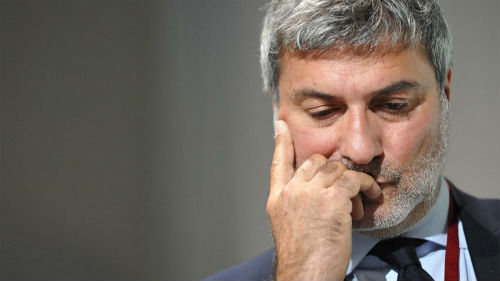
Swedish medicine in turmoil over stem cell researcher
Paolo Macchiarini was one of the hottest names in science, but now dark clouds hang over his work

Paolo Macchiarini / ITAR-TASS Photo Agency
In 2011 stem cell research was probably the hottest topic in science. So it was hardly surprising that a researcher at Sweden’s world-famous Karolinska Institutet became a media sensation when he announced that he had created an artificial windpipe with stem cells. Italian researcher Paolo Macchiarini “seeded” a plastic tube with stem cells taken from a patient’s bone marrow and used it to help 36-year-old Andemariam Beyene, a graduate student from Eritrea living in Iceland.
Five years later Mr Beyene is dead, Macchiarini may be charged with manslaughter, his research seems to be corrupt and unethical, the reputation of the Karolinska Institutet is in tatters, its head has been sacked, its board has been asked to resign and a cloud hangs over the Nobel Prize for Medicine. It is the biggest scandal ever in Swedish medicine.
This is a complex story, but it appears that Dr Macchiarini, though undoubtedly a gifted surgeon, was also a snake oil merchant who fooled top people in the Swedish medical establishment. Investigative journalism, not university committees, exposed the truth.
Macchiarini’s artificial trachea was built on wishful thinking, not clinical success. After all the operations ended in failure and most of them in death, it has become apparent that the stem cell pioneer was just another huckster, much like South Korea’s Hwang Woo-suk.
It should be noted that Macchiarini insists that he had acted ethically and with the best of intentions:
“I would like to add that the welfare of patients has always been my driving concern. Although there may be criticisms of decision-making processes and administrative processes, and these may have had tragic consequences that with hindsight are deeply regrettable, everyone involved in the clinical care of these patients felt that they were doing their very best for these individuals. That should never be overlooked.”
However, independent reviews of his work and how the crisis was handled by the Karolinska suggests that the scientific establishment was blind to his defects. They ignored very negative reports about Macchiarini’s work from Italy and Spain, extra-curricular work in Russia, the fact that he had been arrested in Italy, that some of his research papers were tainted and so on. He was still reappointed without a thorough examination of his qualifications.
Science writer Leonid Schneider, a former stem cell researcher, says “Everybody switched off their brain. The stem cell scientists switched off their brains to the science, and the clinicians switched off their brains to the use of the plastic, which couldn’t even be sutured into patients, and everybody went along with it.” An external inquiry found that Macchiarini worked in an environment that provided a “culture of silence”, a lack of respect for rules and “group thinking”.
“He’s an exceptional person for sure, and he has this faculty for stretching the truth just the right amount,” says Bosse Lindquit, the Swedish TV journalist whose report burst Macchiarini’s bubble. “But in order to be able to seduce the medical community you need to have a whole host of professors who would like to be seduced and who would like to believe that the Nobel prize is very close, or you can make lots of patent money, for example, or corporate money. I think he has an acute ability to suss out the faults and cracks in the system where he could manoeuvre.”
Since a committee of 50 professors from the Karolinska is responsible for choosing the winners of the Nobel Prize in Medicine, its administrative failures reflect upon the coveted award. Bo Risberg a former chairman of the Swedish Ethics Council, has called for the Nobel Prize to be suspended for two years as an “apology” to Macchiarini’s patients and their families.
https://www.bioedge.org/images/2008images/TH_macchiarini_4343.jpg
Creative commons
https://www.bioedge.org/images/2008images/macchiarini_4343.jpg
nobel prize for medicine
research fraud
research misconduct
stem cells
sweden
- How long can you put off seeing the doctor because of lockdowns? - December 3, 2021
- House of Lords debates assisted suicide—again - October 28, 2021
- Spanish government tries to restrict conscientious objection - October 28, 2021
